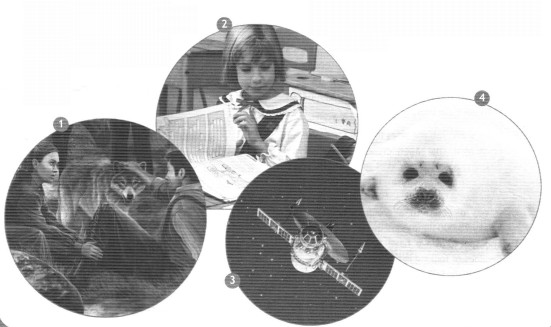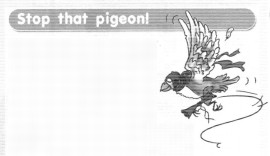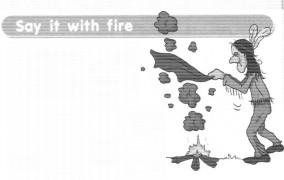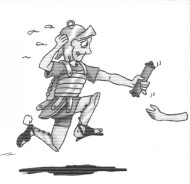|
Гипермаркет знаний>>Английский язык>>Английский язык 11 класс>> Module 6 Communication

Communication
Before you start...
• What sort of house do you live in?
• Do your neighbours do anything that annoys you? What exactly?
Look at Module 8
Find the page numbers for pictures 1 -4.
Find the page numbers for
• a biography
• an essay
• newspaper headlines
Learn how to ...
• offer & accept an apology
• express approval & disapproval
• ask for confirmation/clarification
• repeat what has been said
Practise ...
• reported speech (statements, questions, commands)
• reported modals
• phrasal verbs: talk
• prepositional phrases related to communication
• impersonal style
Write/Make/Give ...
• a description of a day when contact with aliens is made
• a for-and-against essay
• a short article about languages in your country
• a short presentation about means of communication
• a two-minute talk about ocean noise pollution


1 Look at the language family tree. How many languages are spoken in the British Isles? Which is the oldest? Read the texts to find out.


A language similar to Welsh called Brythonic, was the historic native tongue of most of Britain during the Roman occupation and before the Anglo-Saxon invasion. Nowadays, modern Welsh is spoken by roughly 20% of the population in Wales, where it is the official language together with English. It is compulsory for students to study Welsh at school from the age of 5 to 16.
Interesting fact: There is a Welsh colony in Argentina where they still speak Welsh.
Say it! Be' dy'ch enw chi? (pronounced 'bay di'ch enoo ch'ee?') = What is your name?

English only became the language of the majority in Ireland in the 19th century! Today, there are still a few areas in western Ireland where most people use Irish as their first language, while around a third of the population of Ireland overall can speak the language.
Interesting fact: Irish became an official language of the European Union in 2007.
Say it! Is orm e an t-onoir (pronounced 'iss urr-um aay on tonn-ore') = Nice to meet you.

Scottish Gaelic was introduced from Ireland about the 6th century AD, so it is closely related to Irish. Speakers of both languages are able to understand one another quite well. Scottish Gaelic is spoken primarily in the Highlands of Scotland and in the Western Isles, where in some areas over 50% of the population speak it. Unfortunately, however, the use of the language is continually declining.
Interesting fact:'Slogan' is a Scottish Gaelic word.
Say it! S mise... (pronounced 'smih-shuh') = My name is...

Manx is the native language of the Isle of Man, an island of 77,000 people in the Irish Sea. Until the 18th century, the Isle of Man was totally Manx speaking.Today, there are no native speakers of Manx left but about 2% of the population speak it as a second language.
Interesting fact: At five of the island's pre-schools and one primary school, the children are only taught in Manx.
Say it! Kys ta shiu? (pronounced 'Kus ta shoo?') = How are you?

Cornish is the native language of Cornwall, a region in south-west Britain. Cornish died out as a spoken language sometime around the 18th century, but it has recently been revived. Today, around 300 people speak Cornish fluently, the language is taught in some schools and BBC Radio Cornwall has a regular Cornish news broadcast.
Interesting fact: Cornish is a direct descendant of Brythonic, the original native language of Britain.
Say it! Py eur yw hi? (pronounced 'pee urr you hee') = What time is it?
GERMANIC LANGUAGES
English
Two thousand years ago, everyone in the British Isles spoke Celtic languages! English only began to develop in the Sth century AD when Anglo-Saxon tribes invaded Britain from Northern Europe.
2 Listen to and read the text again. Then ask and answer comprehension questions based on the text.
> A: What used to be the native language of most of Britain?
B: Brythonic. What percentage ...
3 Explain the underlined words. Use them in sentences of your own.
4 Close your book and tell your partner one thing you remember about each language.
5 Portfolio: Work in groups. Collect information about some of the languages spoken in your country e.g. name, where spoken, number of speakers, interesting facts etc. Write a short article.

How do you prefer to contact 1).......(distance) friends? Mobile phone, instant messenger, email perhaps? Well, take your pick, because one thing is for sure - it's never been easier! But how did people get messages to one another in the past? Well, they didn't have modern technology, but they certainly had 2)........... (create)!

Did you know that a pigeon will return to its loft, no matter how far or long it is separated from its home? Or that until the 19th century the pigeon (which can travel up to 60 miles an hour) was the fastest means of 3).... (communicate)? Since the ancient Greeks used pigeons to announce the 4)........... (win) of the Olympic games to the Athenians, pigeons have been used throughout history to deliver news about wars, battles and even the latest stock prices! In fact, probably the world's first regular air mail service was Mr Howie's Pigeon Post Service which started in New Zealand in 1896. Later on, during World War I, one particularly 5)........... (hero) pigeon
was even awarded a medal for delivering twelve important messages, despite being shot once!

North American Indians used smoke signals to send messages. After lighting a fire on a hill, they would cover it with a blanket and then remove it, causing a puff of smoke to rise up into the air. They managed to change the number, size, shape and colour of the puffs and also the time between them in order to convey 6)........... (differ) messages such as 'Attention!', 'All's well!' or 'Danger!'. The messages could be seen from up to fifty miles away! The Indians, however, are not the only ones to have used fires to send messages. The Greeks learnt that the city of Troy had fallen in the 12th century BC, by using fires to signal from mountain peak to mountain peak and from island to island, until the message was carried nearly four hundred miles!
For crying out loud!
The ancient Egyptians, Romans and Greeks all used a highly efficient system involving a messenger running or riding to a 'station' with a message and then shouting or passing it on to another waiting 7)...........(message) and so on, until the message reached its 8)....... (destined). A 9)...............(vary) on this system was a network of people shouting their message from field to field and from farm to farm! Or how about whistling to get your message across? On the island of La Gomera in the Canary Islands, Spain, before the 10)..........(arrive) of roads or telephones, the islanders discovered that whistles carried much further than shouting - up to 2.5 miles, in fact! This system became so popular that it developed into a whole language. A study in 1940 identified more than 3,000 different words!

1 How do you communicate with your friends? How did people communicate in the past? Read the text to find out.
2 RNE Complete the gaps with the correct words formed from the words in brackets. Q Listen and read the text again. Then explain the words in bold.
3 If we had no modern means of communication, which of the methods in the text would you choose to communicate by? Why? Discuss.
4 Portfolio: Work in groups. Find information about other means of communication used in the past e.g. signalling with mirrors, telegraphs. Give a short presentation to the class.

Noise annoys all of us from time to time, but for some marine animals, too much noise can be deadly!
I1I I Many ocean creatures, such as whales, seals, sea lions and dolphins, experience their whole world through sound. Whales, for example, use low-frequency sound waves to keep track of each other, tell others where food is available, and find each other to breed. Whales that are sometimes hundreds or even thousands of kilometres away must listen very carefully to hear the faint sounds of these 'whale songs'.
I2I I Unfortunately, in the last one hundred years, humans have begun flooding the oceans with noise, from off-shore oil drilling and the use of explosives for underwater mining, to shipping traffic and military operations. In fact, the ocean is ten times noisier than it was in 1960! As a result, sea creatures can no longer hear and communicate with each other. A blue whale born in 1940, for example, was able to hear sounds from up to 1,000 miles away. Today, this 'hearing bubble' has been reduced to only 100 miles, making it much harder for it to locate a mate. Evidence is also growing that sound blasts from military sonar are so intense that they cause bleeding of the eyes, ears and organs in whales and dolphins. Some also suspect that noise, even if it is quieter than the engine of an average motorboat, can cause whales and other mammals to swim miles away from breeding or feeding grounds, or even to become stranded.
I3I I So, can anything be done about this? Well, environmentalists are currently campaigning for ships and oil companies to move away from areas where there are a lot of sea mammals. They also believe that there should be laws or at least international agreements to control noise levels at sea. However, they certainly haven't got an easy job! Many people don't even believe, or don't want to believe, that ocean noise can have such a drastic effect on animals.
*equipment that uses sound waves to calculate
1 a Listen and match the sounds 1-6 with the words. How does each sound make you feel? e.g. anxious, upset, calm
• waves • a ships horn
• a boat engine • seagulls
• a drill • an explosion
b How might the noises you heard affect the animals in the pictures?
Listen and read the text to find out.
2 RNE Read again and match the headings to the paragraphs. There is one heading that you don't need to use.
A Deadly Noises
B No Solution
C A Difficult Job
D A World of Sound
3 Match the underlined words/ phrases to their meanings below. Then, explain the words/phrases in bold.
• strong • know where sth/sb is
• weak • unable to leave a place
• extreme
4 Portfolio: Imagine you are an environmentalist trying to persuade a company to stop making noise near ocean animals. Give a two-minute talk. Include:
• why hearing is important to ocean mammais
• how noise affects them
• what you want the company to do

Read the passage, then choose the correct answer (A, B, C or D) for questions 1 -7.
Throughout history and in every civilisation, people have felt the need to communicate in secret. In wartime, military secrets need to be transferred securely to commanders without being understood by the enemy. During revolutions, those plotting to overthrow the establishment need to ensure their communications remain undisclosed. The history of secret communication is long and fascinating. World events have changed on many occasions because of secret messages - secrets that were kept and secrets that were not!
There are two ways to communicate in secret - either you conceal the fact that you are sending a message at all, ('steganography') or you obscure the meaning of your message rather than its actual existence ('cryptology'). Steganography is very old. In 440 BC, the Greek ruler, Histiaeus, sent a message to a fellow plotter in a revolt by shaving off the hair of his most loyal slave, tattooing a message on his head, allowing the slave's hair to grow back, then sending him to deliver the message. The slave passed through enemy lines easily since he seemed to be carrying no communication. Another very old form of steganography is invisible ink. Inks made of simple organic materials such as milk or lemon juice, which turn dark when held over a flame, were used as early as the first century AD for very serious communications. During the Second World War, both sides raced to create new secret inks and to find developers for the enemy's inks, although in the end this form of steganography became impractical due to the large amount of communications involved.
Although steganography is a very clever way to communicate in secret, it does have an Achilles heel. If the messenger does not do a particularly good job concealing their message and someone finds it, all its secrets will be immediately revealed. This weakness soon led to the idea of hiding the actual meaning of messages, so that they could not be read, even if they were discovered. The result was the development of cryptology.
Cryptology hides the meaning of messages by using codes. Codes are essentially secret languages. Julius Caesar invented one. He replaced every letter in a word by the letter three places away from it in the alphabet. A was D, B was E, and so on. Later on, any code that used a system of letter replacement such as this was referred to as a 'Caesar code'. Of course, it doesn't take much brain power to figure out most of these codes! Today, code makers devise practically unbreakable codes using highly sophisticated mathematics and computer power.
Are cryptology and steganography used now? Well, you may be surprised to learn that secret communication is a part of everyday life! For example, every time you use your credit card to buy something from a company over the Internet, cryptology is employed. Very complicated codes turn your credit card number into a pile of gibberish that only the retailer can decipher, not anyone else. Steganography is also thriving in the digital world. Secret messages can easily be hidden in email, audio and image files. This is because most digital documents contain useless areas of data, so some of their information can be altered without obvious effect. This is of concern to governments as they fear that criminals may be concealing messages in files sent over the Internet.
One thing is certain - secret communication is still just as much a part of life today as it was millennia ago!
1 Secret communication
A was only used in the past.
B has altered the course of history at times.
C can lead to revolutions or wars.
D was first used by military commanders.
2 In 440 BC, the Greek ruler, Histiaeus
A secretly communicated with the enemy.
B started a revolt by sending a hidden message.
C learnt of a plot through a secret message.
D sent a secret message past the enemy.
3 Invisible ink
A is the oldest form of steganography.
B was used the most effectively during WW2.
C must be made from organic materials.
D can sometimes be made visible with heat.
4 Steganography does not
A have any disadvantages.
B depend on the skill of the messenger.
C hide the meaning of a message.
D pre-date cryptology.
5 'Caesar Codes'
A were all invented by Julius Caesar.
B only use certain letters of the alphabet.
C are usually quite easy to break.
D use sophisticated mathematics.
6 Internet credit card transactions
A use steganographic techniques.
B are made secure by cryptology.
C make a retailer's job easier.
D are hidden in digital files.
7 Steganography is still used a lot today because
A secret communication is more important than ever before.
B governments use it to send information securely.
C it can help to catch criminals.
D it's easy to hide secret messages in digital documents.
Listen and choose A, B or C for statements 1-7.
1 Susan won't be able to let Mike know if she's going to be late.
A True B False C Not stated
2 Mike has never had a mobile phone.
A True B False C Not stated
3 Susan's grandparents have just bought a mobile phone.
A True B False C Not stated
4 Mike is usually at home when Susan calls.
A True B False C Not stated
5 Susan doesn't like sending emails.
A True B False C Not stated
6 Susan has her mobile phone switched on all the time.
A True B False C Not stated
7 In the end Susan convinces Mike to buy a mobile phone.
A True B False C Not stated
Speaking
You and a friend would like to learn Spanish and are discussing the best way to go about it. You can choose from:
• spending a month in Spain living with a Spanish family
• going to an evening class three nights a week
• buying a 'teach yourself' pack with a book and CDs
• finding a private teacher to teach you both twice a week
You begin the conversation and have to decide on which option (only one) to choose. The teacher will play the part of your friend. Remember to:
• discuss all the options;
• take an active part in the conversation and be polite;
• come up with ideas;
• give good reasons;
• find out your friend's opinions and take them into account;
• invite your friend to come up with suggestions;
• come to an agreement
Complete the gaps with the correct word(s) formed from the words in bold.
What's in a Name?
You might think that a name is just a name, but the reality is much more interesting than that and goes back to the 1).............of human society.
To start with, everyone has a first name, a surname and 2) ...........a middle name, don't they? Not always. In Mongolia, until recently, people only had a first name, something that probably caused a lot of confusion. Also, not all 3)........... are addressed by a given first name. In China, the family name comes first with the given name following.
Your family name says a lot about your ancestors. Common English surnames, like Baker and Butcher, tell us what 4)...........a long-dead relative had. Names like Hill, Field and Rivers tell us where people used to live. Johnson means son of John, and in Scotland the prefix Mac means the same.
Given first names often refer to a 5)............ that parents would like their children to have such as Sophia, which stands for wisdom, or Anna meaning grace. Perhaps something royal is more 6) ........ ? How about Steven and Sara, meaning crown and princess.
Whichever name you go by, one thing is certain, it goes with you for life. Even if you are one of the 7)............ ones (Abbie Birthday or Robin Banks), your name is something you're just going to have to live with.
BEGIN OCCASION NATION OCCUPY CHARACTER PREFER LUCK
RNE Writing
Comment on the following statement:
Our lives would all be enriched greatly if we could have a chip planted in our brains enabling us to speak any language we wished. However, this idea could have some disadvantages too.
What can you say for and against this idea? Write an essay of 120-180 words using the plan below.
Para 1: Introduction (state the problem)
Para 2: State arguments 'for'
Para 3: State arguments 'against'
Para 4: Draw a conclusion
Progress Check
1 Fill in: telescope, satellite, galaxy, human, shrug, wags, air, track, contain, raised.
1 I ............. my shoulders when I don't know the answer to a question.
2 The moon is the Earth's ..............
3 He............his eyebrows in surprise.
4 They were talking so fast it was difficult for me to keep ...........of the conversation.
5 We live in a .................... called the Milky Way.
6 I like to look at the stars through my ............
7 NASA has sent messages into space with information about the.............race.
8 When my mum..............her finger at me, I know I'm in trouble.
9 He was so excited, he couldn't...............himself.
10 It is quicker to send the parcel by................. mail rather than standard mail.

2 Report the following using the verbs in the list.
• apologise • beg • warn • suggest • deny
1 "I didn't take the money," she said.
2 "I'm sorry I broke your CD player," he said to her.
3 "Please, please lend me the money," he said to her.
4 "Why don't we meet later," she said.
5 "Don't do that again or you'll be in trouble," his dad
said.

3 Complete the sentences using the words in bold. Use two to five words.
1 "Have you called your mother lately?", he asked me. had He asked me........ my mother lately.
2 "Let's text each other about it later?", he said, texting He...........it later.
3 "I didn't call because I was working late last night", said Jane.
been Jane told me she had not called.............
late the night before.
4 "Can you call me to confirm tomorrow?", asked Tom.
able Tom asked if I.........to confirm the next
day.
5 "Are you going to the party tonight?", he said.
asked He..............to the party that evening.

4 Complete the phrasal verbs with the correct particle.
1 I never talk...........to anyone - it's not nice.
2 Jack managed to talk Tim............. and they are friends again.
3 Talking..........to your teacher is rude.
4 My friend talked me................ buying a new mobile although I didn't need one.
5 I always talk...............my problems with my mum.

5 Fill in the gaps with the correct preposition.
1 Our teacher insists.............correct punctuation.
2 He has been complaining ............ backache for several days now.
3 The new employee assured his boss .............. his complete honesty.
4 Don't apologise.............breaking the vase. I djdn't like it anyway.
5 Danny's always complaining ............ not having enough money.

6 Match to form exchanges.
1 I'm very sorry.
2 I beg your pardon.
3 She said ! broke the vase.
4 Did you say Ј1.50?
5 It's bad manners to point!
a I do apologise.
b I can't believe she did that!
c I said it's half past two.
d That's all right.
e Yes, that's right.

NOW I CAN...
• talk and write about space technology
• talk about newspapers and the media
• apologise and accept apologies
• ask for repetition, confirmation and clarification
• use reported speech
• write a for-and-against essay
• write a short article about native languages
• give a presentation on means of communication
... in English
Английский язык. 11 класс : учеб. для общеобразоват. учреждений / [О.В. Афанасьева, Дж.Дули, И.В. Михеева и др.]. - 2-е изд., доп. и перераб. - М.: Express Publishing : Просвещение, 2009. - 244 с. : ил. - (Английский в фокусе).
Планирование по английскому языку, учебники и книги онлайн, курсы и задачи по английскому языку для 11 класса скачать
Содержание урока
 конспект урока конспект урока
 опорный каркас опорный каркас
 презентация урока презентация урока
 акселеративные методы акселеративные методы
 интерактивные технологии
Практика интерактивные технологии
Практика
 задачи и упражнения задачи и упражнения
 самопроверка самопроверка
 практикумы, тренинги, кейсы, квесты практикумы, тренинги, кейсы, квесты
 домашние задания домашние задания
 дискуссионные вопросы дискуссионные вопросы
 риторические вопросы от учеников
Иллюстрации риторические вопросы от учеников
Иллюстрации
 аудио-, видеоклипы и мультимедиа аудио-, видеоклипы и мультимедиа
 фотографии, картинки фотографии, картинки
 графики, таблицы, схемы графики, таблицы, схемы
 юмор, анекдоты, приколы, комиксы юмор, анекдоты, приколы, комиксы
 притчи, поговорки, кроссворды, цитаты
Дополнения притчи, поговорки, кроссворды, цитаты
Дополнения
 рефераты рефераты
 статьи статьи
 фишки для любознательных фишки для любознательных
 шпаргалки шпаргалки
 учебники основные и дополнительные учебники основные и дополнительные
 словарь терминов словарь терминов
 прочие
Совершенствование учебников и уроков прочие
Совершенствование учебников и уроков
 исправление ошибок в учебнике исправление ошибок в учебнике
 обновление фрагмента в учебнике обновление фрагмента в учебнике
 элементы новаторства на уроке элементы новаторства на уроке
 замена устаревших знаний новыми
Только для учителей замена устаревших знаний новыми
Только для учителей
 идеальные уроки идеальные уроки
 календарный план на год календарный план на год
 методические рекомендации методические рекомендации
 программы программы
 обсуждения
Интегрированные уроки обсуждения
Интегрированные уроки
Если у вас есть исправления или предложения к данному уроку, напишите нам.
Если вы хотите увидеть другие корректировки и пожелания к урокам, смотрите здесь - Образовательный форум.
|





















